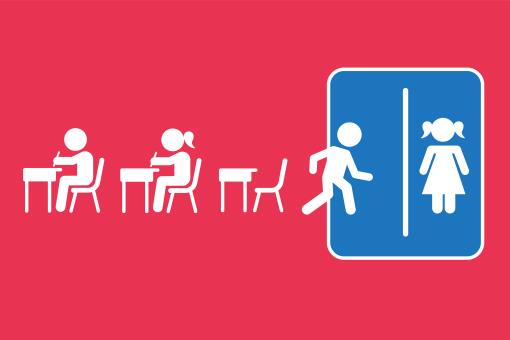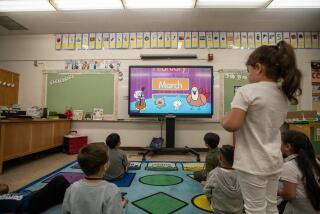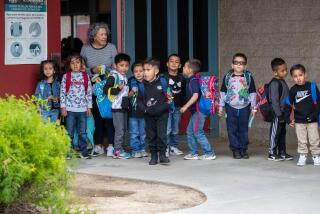Help children learn to use the bathroom on their own with these expert resources

- Share via
Teaching your child to be fully independent when going to the bathroom is important now that public schools are enrolling 4-year-olds in transitional kindergarten. Consider this Potty Training II.
Most children are potty-trained between ages 2 and 3, but that can vary depending on individual readiness and when a parent can take time from work to teach them, according to Dr. Tanya Altmann, a spokesperson for the American Academy of Pediatrics and a pediatrician in Calabasas.

Schools are encouraging parents of the state’s youngest learners, 4- and 5-year-olds, to make sure their children are not only fully potty-trained, but can use the bathroom alone as assistance is either not available or limited. After an accident, a child is typically sent to the school nurse or health office and parents are called to pick them up.
And remember that it can take much longer for children to sleep through the night without diapers, a developmental milestone that sometimes doesn’t happen until age 5 or 6.
Here are some resources for potty training and restroom independence:
Play a potty song.
Songs like “Daniel Tiger’s Stop & Go Potty” walk kids through each of the steps, including knowing when it’s time to stop playing and head to the bathroom. American Academy of Pediatrics spokesperson Dr. Whitney Casares says that songs are a great way to engage young kids as they learn.
“It’s a way to explain potty training to kids, a way to normalize it for kids, and then also a way to build consistency,” she said, comparing it to how schools use cleanup songs to help children learn how to pick up their toys.
Read potty books directed toward kids.
There are many books geared toward children to help with potty training. The Orange County Department of Education recommends “Diapers Are Not Forever” by Elizabeth Verdick, which offers plenty of encouragement to children. The Center for District Innovation and Leadership recommends a few books, too, in both English and Spanish, including “Everyone Poops” by Taro Gomi.
Access resources from the American Academy of Pediatrics.
The American Academy of Pediatrics has assembled resources from pediatricians across the state. Its second edition of “The American Academy of Pediatrics Guide to Toilet Training” can walk you through questions, including when to start, how to deal with bedwetting and how to approach potty training with children with special needs. You can also access pieces on potty training written by pediatricians on its parent-oriented website healthychildren.org.
Altmann, who wrote the book “Baby and Toddler Basics” for the American Academy of Pediatrics, said these books and articles provide guidance for getting started and addressing related issues, including constipation.
Visit your school district’s website.
As districts welcome 4-year-olds, some are offering new online resources to the public. San Diego Unified provides a guide that details what it means to be fully potty-trained and shares recommendations, printable charts and articles to guide parents. The guide from Las Virgenes Unified provides articles along with links to some songs about potty training directed toward children.
Talk to your pediatrician.
If your child is struggling to potty-train, talk to your pediatrician for guidance. Pediatricians can make sure there are no underlying medical issues, Casares said. Guidance can also sometimes vary depending on family circumstances, Altmann said.
Most importantly, be consistent when training and remember to encourage your child. Get excited, give them a hug or a high-five each time they give it a try. Reward them for their progress and don’t put too much pressure on them to learn.
“Check in with yourself and your own ego and your own sense of anxiety around your child’s potty training,” Casares said. “Because if you’re feeling all this pressure inside of yourself, your child is going to pick up on that.”
It’s important to note too that a big event such as the first day of school or a new sibling might cause a slight regression in your child’s progress, too, Casares added.
This article is part of The Times’ early childhood education initiative, focusing on the learning and development of California children, from birth to age 5. For more information about the initiative and its philanthropic funders, go to latimes.com/earlyed.
More to Read
Sign up for Essential California
The most important California stories and recommendations in your inbox every morning.
You may occasionally receive promotional content from the Los Angeles Times.











